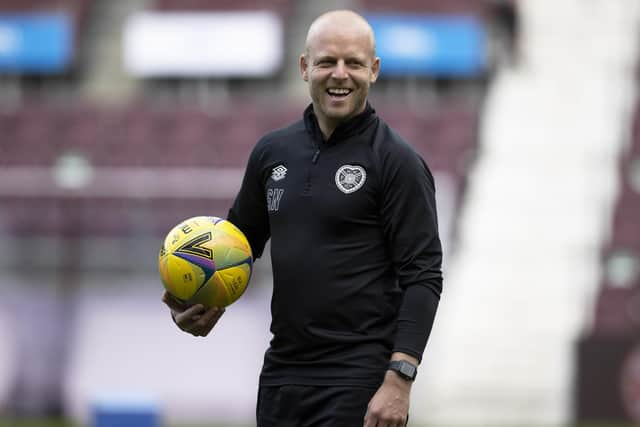"Bigger picture": Steven Naismith delivers Hearts B progress report and Lowland League verdict
and live on Freeview channel 276
After two wins from their opening 15 games, they have three victories from their last four. Even though half the team was missing on Saturday and they could list only two subs, Hearts came close to beating title challengers Tranent on their own patch. In the bottom three or four for most of the season, they are now up to 13th in the 19-team league and looking up rather than down.
Results and league position, of course, are not priorities for Naismith. Far from it. It’s all about giving talented teenagers the opportunity to face battle-hardened competitors. It’s about testing and preparing them for senior first-team football. But better results are an indicator of the progress that has already been made since the start of the season in July.
Advertisement
Hide AdAdvertisement
Hide Ad“There’s definitely a progression,” the club development manager told the Edinburgh Evening News. “We’ve definitely turned a corner from that initial blast of games. We had a tough fixture list at the start of the season. In one month we played eight fixtures and came up against nearly everybody who had aspirations at the top end of the table of going up. There were a lot of individual mistakes, which comes when you have young players. But over the last month our performances have been brilliant in terms of how we have played. Only small moments have cost us. So the boys can see the progression. Our performances have been better. Their confidence is better and the reward for some of them is going away to Spain with the first team. We’re going in the right direction.”


That much was clear from the performance at Foresters Park on Saturday, where a very young and inexperienced Hearts team dominated possession for an hour and went two goals in front. Tranent turned it around to win 3-2 by using superior physicality to their advantage. But that’s exactly the type of challenge Naismith wants and expects his young players to come up against.
“Physicality definitely played a part,” he acknowledges. “They are kids. The physicality advantage is obvious. Opponents are bigger and stronger. But it is also the organisation and the understanding. But that will come. We will watch the video of the Tranent match and identify the small moments. They will be things that the boys won’t even recognise – but I’ll show them how they could have managed the game better.
“When we are being dominated or the game is being played in our half of the pitch, it’s about knowing what to do to change that. If the opponents are just gambling and pressing all in, you can’t always play round that. You need to be sensible and maybe take a foul or take an extra touch and draw them in. There are so many other options, but we will go through that. Physique definitely comes into it because they are kids against grown men who understand the game. But I’m really positive because our youngsters were so good.”
Advertisement
Hide AdAdvertisement
Hide AdNaismith hasn’t changed the way he is asking Hearts B to play in recent weeks, but his players are learning quickly about the nuances of managing a game and being streetwise. They’ll need all of that knowledge again on Wednesday when they host a Spartans side at Ferguson Park who are also in the title race and thirsty for three points.
“The tactics don’t change that often,” Naismith continued. “Their mentality has changed because they understand the game more. They understand that how we set up before a game is different to how we play the game in the 68th minute because the scoreline is different, the personnel might be different, the opposition’s set up might be different. You have to adapt and our players are now starting to think about that and see it on the pitch. They are enjoying learning about it and they are getting it. That’s progress.”
Naismith wants that progress to continue by staying in the Lowland League as a guest club next season. Along with the Old Firm, Hearts have paid £40,000 to participate in 2022/23 but are not eligible for promotion, or indeed relegation. Staying in next season will depend on what the member clubs decide and they are under pressure to make the league more fluid by opening up more promotion opportunities from below. But from a purely Hearts perspective, Naismith has no doubt that the Lowland League is the best environment available for developing young players.
“We’ve been really happy with the Lowland League and what it has provided for us, especially getting the call to join so late,” he added. “That had an impact at the start of the season in terms of our preparation and structure. But it is definitely the way forward for Scottish clubs and young players to give themselves a better chance of going on to have a career.
Advertisement
Hide AdAdvertisement
Hide Ad“The reserve system isn’t what it used to be when I was a kid coming through. Half the players you’d be up against were from first teams, which gets you that experience and nous. That’s gone now. First-team players very rarely play in reserve games.
“So we need to try and use another avenue to stimulate the young players so they can learn the game. A competitive league is the best way to do it. We are up against a team who are in the mix for promotion to get up the football pyramid. That’s what Tranent are fighting for every week. We’ve just come up against that and we have to learn how to deal with it.
“The way our young boys have picked it up and grasped it so well shows that the process is working. That’s the bigger picture here.”
